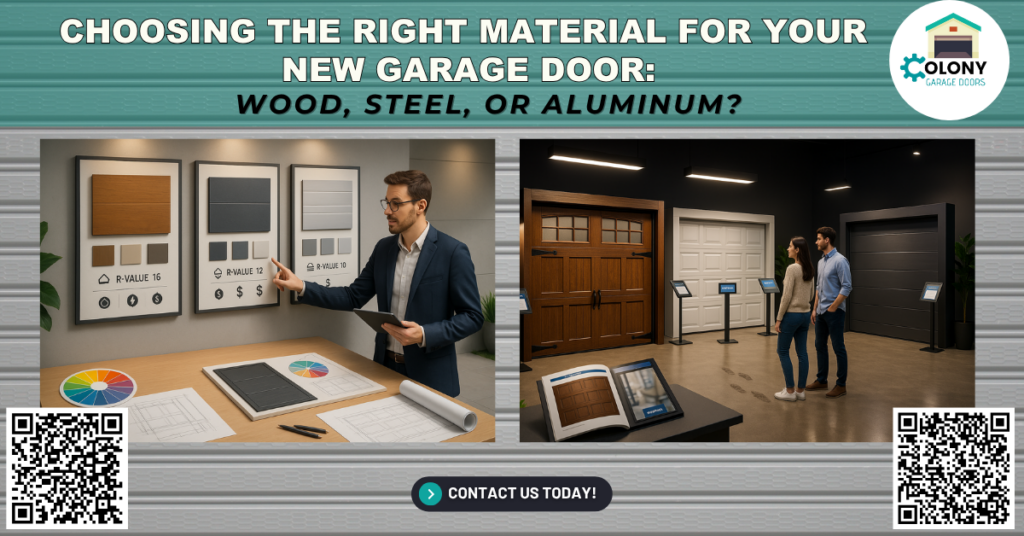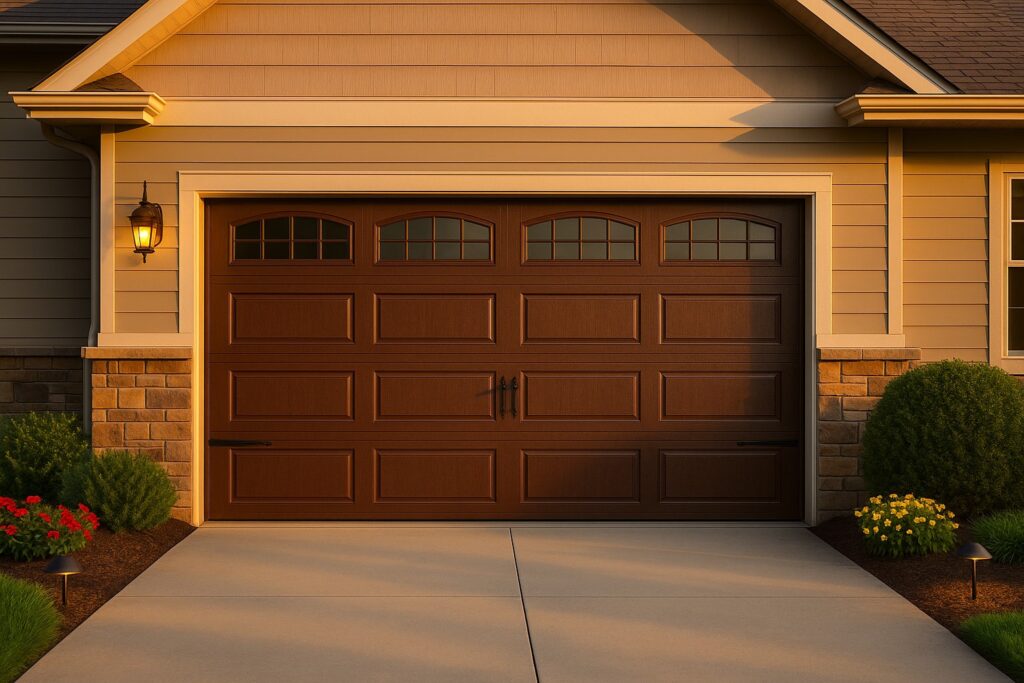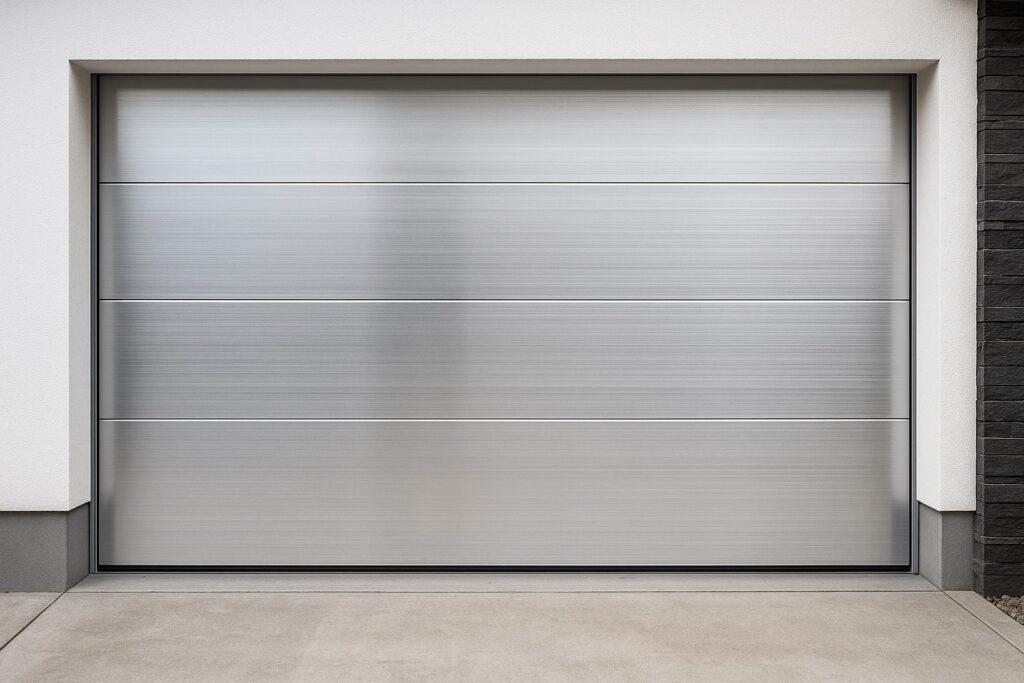Choosing the Right Material for Your New Garage Door: Wood, Steel, or Aluminum?

When the Rodriguez family of Sugar Land, TX, contacted Colony Garage Doors, their once-pristine wooden garage door had become warped and weather-beaten after years of Houston heat and Gulf humidity. They needed a garage door replacement that combined beauty, security, energy efficiency, and fast. Their old door not only affected their curb appeal but was also driving up utility bills due to poor insulation.
They aren’t alone. Did you know that according to Remodeling Magazine’s Cost vs. Value Report, a new garage door ranks as one of the highest-return home improvement projects, recouping up to 93% of its installation costs? Whether you’re replacing a worn-out door, remodeling your garage, or building a new home, choosing the right garage door material is one of the most important decisions you’ll make. Each material, wood, steel, and aluminum, has unique advantages and trade-offs related to cost, durability, style, and maintenance.
At Colony Garage Doors, we specialize in helping homeowners and business owners across Sugar Land and surrounding areas find the perfect garage door for their needs. In this comprehensive guide, we’ll explore the pros, cons, features, and best use cases for wood, steel, and aluminum garage doors. If you’re shopping for a new door and feeling overwhelmed by the styles, materials, and features available, this is the guide for you.
Why the Right Material Matters for Your New Garage Door
Your garage door material plays a significant role in the performance, security, and long-term value of your garage. It affects everything from your home’s energy efficiency and weather resistance to maintenance frequency and garage door opener compatibility. More importantly, the material influences the installation costs, expected lifespan, and whether or not your garage door will meet the safety features required in your region.
For example, if your garage faces the street, it becomes a prominent feature of your home’s curb appeal. Choosing the right material ensures your door not only complements your home’s style but also functions well through the changing seasons. Additionally, homeowners with attached garages should consider how materials contribute to R-value, a measure of thermal resistance. A poorly insulated door can lead to higher heating and cooling bills, especially during cold weather or the extreme Texas summer heat.
Another key factor is security. Some garage door materials, such as steel, provide greater resistance against intrusions, while smart technology integrations in openers can enhance security with real-time monitoring. Understanding the installation complexity, labor costs, and maintenance requirements of each material will help you make a more informed and confident decision.
Wood Garage Doors
Overview
Wood garage doors have long been valued for their rich, natural appearance and timeless appeal. They are a top choice for homes with traditional, rustic, or craftsman-style architecture, and they offer a unique sense of luxury and authenticity that synthetic materials often struggle to replicate. With proper care, a wooden garage door can become a lasting visual centerpiece of your home’s exterior.

Pros
Wood provides unmatched customization opportunities. You can select from a wide array of styles, grains, paneling options, and finishes. Homeowners can opt for solid wood or engineered wood cores with overlays, depending on their desired balance between cost and durability. This flexibility makes wood garage doors ideal for custom garage door projects.
From an acoustic standpoint, wood absorbs vibrations better than metal, resulting in quieter operation, an important consideration for households with bedrooms near or above the garage. Wood also offers moderate insulation, and when paired with quality weather stripping and insulated cores, can be effective in reducing temperature fluctuation.
Cons
Despite its charm, wood does come with higher maintenance requirements. You’ll need to repaint or re-stain the door every 2–3 years to protect against moisture, pests, and UV rays. Without this routine maintenance, doors may warp, crack, or delaminate, especially in humid climates like Sugar Land.
The weight of wooden garage doors also makes them more demanding on garage door openers and springs, potentially increasing labor costs for installation and repair. In terms of pricing, wood is often the most expensive option both initially and over time due to the upkeep involved.
Ideal For
- Homeowners seeking distinctive curb appeal and architectural charm
- Properties with historical or craftsman influences
- Detached garages where weather sealing is less critical
- Customers investing in a high-end, custom garage door design
Steel Garage Doors
Overview
Steel garage doors are the most popular choice for homeowners and businesses alike, largely due to their excellent balance of cost, strength, and design flexibility. Available in everything from basic single-layer doors to high-end, fully insulated models, steel doors suit nearly any architectural style or budget.
Pros
One of the key benefits of steel is its exceptional durability. Unlike wood, it does not warp, crack, or attract insects. High-quality steel garage doors often feature galvanized coatings, which help protect against corrosion and rust, extending the door’s lifespan significantly, sometimes upwards of 20 years with proper care.
Steel also supports smart garage door openers and modern safety upgrades. Many newer models integrate seamlessly with smart technology, allowing homeowners to control their garage doors from their smartphones, set automatic closing times, and receive alerts when the door is accessed.
Energy efficiency is another major plus. Many steel doors come insulated with polyurethane or polystyrene cores, offering R-values as high as 18. This helps regulate garage temperature, which is especially beneficial for attached garages or those used as workshops.
Cons
While durable, steel is not immune to damage. Dents from hail, car impacts, or children’s toys can mar the surface, although many doors now come with dent-resistant coatings. Another concern is rust; if the protective finish is scratched or compromised, exposure to moisture can lead to corrosion over time.
Also, steel is a more industrial-looking material. While it can be customized with faux wood finishes, paneling, and window inserts, it lacks the natural aesthetic appeal of real wood garage doors.
Ideal For
- Homeowners seeking a low-maintenance, long-lasting solution
- Properties with attached garages need strong insulation
- Budget-conscious customers who don’t want to sacrifice quality
- Commercial spaces requiring durable sectional garage doors
Aluminum Garage Doors
Overview
Aluminum garage doors are known for their lightweight construction, modern appeal, and corrosion resistance. Commonly paired with large glass panels or sleek minimalist designs, they’re a perfect match for contemporary or mid-century modern homes.

Pros
Being lightweight, aluminum doors reduce strain on mechanical parts like the garage door opener and springs, extending the life of your system. This also makes installation easier and sometimes less expensive in terms of labor costs. Because aluminum is naturally rust-proof, it performs exceptionally well in humid or coastal climates.
Design-wise, aluminum allows for the incorporation of frosted, tinted, or clear glass, offering a stunning modern look and natural lighting. These styles are increasingly popular for garage door replacements in both homes and showrooms. Eco-conscious homeowners also appreciate aluminum’s recyclability and lower carbon footprint compared to other materials.
Cons
Despite its rust resistance, aluminum is softer than steel and more prone to dents. If your garage is subject to high traffic or the occasional basketball game, you may need to repair or replace panels more frequently. It also provides limited insulation unless paired with insulated cores or backing materials.
In terms of customization, aluminum is somewhat limited compared to wood or steel, especially if you’re seeking traditional or rustic aesthetics.
Ideal For
- Modern homes are looking for a sleek, minimalist style
- Homeowners in humid or salty air environments
- Detached garages where insulation isn’t critical
- Customers looking for low-maintenance, corrosion-resistant options
Comparing Materials Side by Side
Feature | Wood | Steel | Aluminum |
Durability | Moderate | High | Moderate |
Maintenance | High | Low | Low |
Insulation (R-Value) | Moderate | High (with foam) | Low–Moderate |
Weight | Heavy | Medium | Light |
Customization | Excellent | Good | Fair |
Cost | $$$ | $$ | $$ |
Rust Resistance | Low | Moderate (if treated) | High |
Design Variety | High | Very High | Moderate |
Smart Compatibility | Yes (add-on hardware) | Yes (wide integration) | Yes (select systems) |
Additional Considerations Before You Decide
1. Budget and Long-Term Costs
Your upfront investment is just the beginning. Consider how much time, money, and effort you’ll spend over the next 10–20 years. Wood doors require frequent sealing or painting. Steel doors are the most cost-effective long term due to their durability. Aluminum falls somewhere in between, offering low maintenance but less strength.
2. Local Climate
In Sugar Land, TX, humidity and high summer temperatures are a reality. Steel and aluminum both handle moisture better than wood, though steel can still rust without protection. If you’re near the coast, aluminum may offer the best long-term resilience.
3. Usage Patterns
If you frequently enter and exit your garage, you’ll want a material that supports high-cycle usage without frequent repairs. Steel offers a good balance of strength and longevity. Lighter materials like aluminum put less stress on garage door openers and can be ideal for homes with elderly residents or children.
4. Home Style and Curb Appeal
If you’re looking to boost your home’s curb appeal, wood may be your best bet. It adds elegance and warmth, especially in craftsman or carriage house designs. For a modern look, aluminum with glass panels is unbeatable.
5. Safety and Smart Features
Modern garage doors often include smart openers, motion sensors, auto-reverse mechanisms, and integration with security cameras. Make sure the material you choose is compatible with the garage door guides and electronics you plan to install.
Final Thoughts
Selecting the right material for your new garage door requires thoughtful consideration of your budget, home style, climate, and usage habits. With options like wood for luxury appeal, steel for strength and value, and aluminum for modern aesthetics and low maintenance, you’re sure to find the perfect fit for your home or business.
Remember, a garage door isn’t just a functional element; it’s a central design feature that affects security, energy use, and the overall feel of your house. Taking the time to choose wisely can improve your quality of life and even increase your home’s market value.
If you’re still unsure which option is right for you, let the professionals at Colony Garage Doors help guide you.
How Can Colony Garage Doors Help You?
At Colony Garage Doors, we take pride in delivering expert advice, high-quality garage door installation, and dependable repair services to the Sugar Land community and beyond. With decades of experience and a commitment to customer satisfaction, we help homeowners like you find the perfect garage door that fits your style, budget, and lifestyle.
We offer:
- Personalized design consultations for residential and commercial properties
- Same-day service for garage door opener, spring, or panel repairs
- A wide range of garage door styles, materials, and finishes
- Smart upgrade options and advanced safety features
- Professional, warrantied installations with clear pricing
📍 Visit Us:
Southwest Fwy Unit A, Sugar Land, TX 77479
📞 Call Today:
(832) 345-9267
Don’t wait until your current door fails or becomes unsafe. Contact Colony Garage Doors today and get a new garage door that’s built to last, looks incredible, and provides unmatched convenience and peace of mind.
Colony Garage Doors – Trusted Solutions. Lasting Impressions.
Frequently Asked Questions (FAQs)
1. How long does a typical garage door installation take?
Most professional garage door installations take between 4 to 6 hours, depending on the door size, material, and any additional features like openers or insulation.
2. Can I paint or stain my garage door after installation?
Yes, many garage doors, especially wood and steel, can be painted or stained post-installation, but it’s best to use finishes recommended by the manufacturer to avoid voiding the warranty.
3. What type of garage door is best for hurricane-prone areas?
For areas with extreme weather or hurricanes, wind-rated steel garage doors with reinforced hardware and bracing are the safest and most reliable option.
4. How often should I have my garage door professionally serviced?
It’s recommended to have your garage door inspected and serviced by a professional at least once a year to maintain safety, performance, and longevity.
